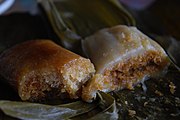Kue kochi or koci (also known as passover cake in English) is a Maritime Southeast Asian dumpling (kue or kuih) found in Javanese, Malay and Peranakan cuisine, made from glutinous rice flour, and stuffed with coconut fillings with palm sugar.[1][2]
 Kue kochi in Singapore. | |
| Alternative names | Koci |
|---|---|
| Type | Dumpling, kue, kuih |
| Course | Dessert or snack |
| Place of origin | Southeast Asia |
| Associated cuisine | Indonesia, Malaysia, Singapore, Brunei |
| Created by | Javanese and Malay |
| Main ingredients | Glutinous rice flour, shaved coconut, palm sugar[1] |
| Similar dishes | Mont phet htok, Bánh phu thê |
In Brunei, Indonesia, Malaysia and Singapore, this snack is often as a dessert and can be eaten anytime (during breakfast or tea time). The black colour of the unpolished rice symbolises death, while the sweet filling represents resurrection.[2]
See also
edit- Peranakan cuisine
- Mochi - similar dessert in Japan made from glutinous rice flour.
References
edit- ^ a b "Kuih Koci". Poh's Kitchen. 11 August 2010. Retrieved 5 March 2017.
- ^ a b David Y. H. Wu; Chee Beng Tan (2001). Changing Chinese Foodways in Asia. Chinese University Press. pp. 135–. ISBN 978-962-201-914-0.